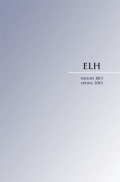
ELH
Scope & Guideline
Advancing Interdisciplinary Scholarship in Literary Theory
Introduction
Aims and Scopes
- Historical Contextualization of Literature:
ELH emphasizes the importance of situating literary works within their historical, cultural, and political contexts, allowing for a deeper understanding of their significance and influence. - Interdisciplinary Approaches:
The journal encourages interdisciplinary studies, integrating perspectives from history, philosophy, sociology, and cultural studies to enrich literary analysis. - Focus on Canonical and Marginalized Texts:
ELH publishes research on both canonical works and those that have been historically marginalized, aiming to provide a more comprehensive view of English literary history. - Thematic and Genre Studies:
The journal frequently explores specific themes and genres, examining their evolution and representation across different periods and contexts. - Innovative Critical Methodologies:
ELH supports the use of innovative and diverse critical methodologies, including feminist, postcolonial, queer, and ecocritical approaches, to challenge traditional literary interpretations.
Trending and Emerging
- Ecocriticism and Environmental Themes:
There is a growing interest in ecocritical perspectives, examining the relationships between literature and environmental issues, which resonates with current global ecological crises. - Postcolonial and Race Studies:
The journal has seen an increase in articles focusing on postcolonial theory and race, reflecting a broader cultural shift towards examining literature through the lens of race, identity, and colonial histories. - Gender and Queer Studies:
Research exploring gender dynamics and queer representation in literature is on the rise, indicating a commitment to diversifying literary analysis and addressing contemporary social issues. - Affect Theory and Emotional Engagement:
Emerging themes in affect theory highlight the emotional dimensions of literary texts, exploring how feelings and emotions shape reader responses and interpretations. - Digital Humanities and New Media:
The incorporation of digital humanities methodologies is becoming more prevalent, as scholars leverage technology to analyze texts and explore new forms of literary expression.
Declining or Waning
- Traditional Formalism:
There has been a noticeable decline in papers that strictly adhere to traditional formalist analyses, indicating a move towards more contextual and theoretical approaches. - Exclusively Historical Narratives:
Research that solely focuses on linear historical narratives without interdisciplinary connections is becoming less common, as the journal favors more complex, multifaceted analyses. - Biographical Criticism:
Papers centered exclusively on the biographical details of authors, without broader thematic or contextual implications, are increasingly rare, reflecting a shift towards more critical interpretations. - Simplistic Genre Categorization:
The journal is moving away from rigid genre categorizations, favoring nuanced discussions that acknowledge the fluidity and intersections of genres. - Canonical Exclusivity:
There is a decreasing emphasis on strictly canonical literature, as ELH increasingly incorporates diverse voices and texts that challenge traditional literary canons.
Similar Journals
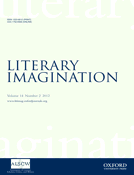
Literary Imagination
Engaging Minds Through Literary ExplorationLiterary Imagination, published by Oxford University Press, is an esteemed journal that delves into the intricate world of literature and literary theory. With the ISSN 1523-9012 and the E-ISSN 1752-6566, this journal serves as a pivotal platform for scholars and practitioners in the field, striving to advance the understanding of imaginative literature from various critical perspectives. Boasting a 2023 rank of #751 out of 1106 in the Arts and Humanities category on Scopus, and categorized in the Q3 quartile for literature and literary theory, the journal is recognized for its contribution to the academic discourse. It aims to foster a vibrant academic community through the publication of innovative research, critical essays, and interdisciplinary studies that engage with the complexities of literary creation from 2009 to 2024. While currently not an open access journal, its rich repository of scholarly work remains accessible to researchers, professionals, and students aiming to enrich their understanding of literary narratives and their theoretical frameworks.
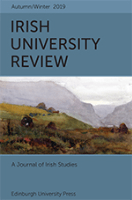
IRISH UNIVERSITY REVIEW
Illuminating Contemporary and Historical Literary NarrativesIRISH UNIVERSITY REVIEW is a distinguished academic journal published by Edinburgh University Press, specializing in the fields of Literature and Literary Theory. With an ISSN of 0021-1427 and an E-ISSN of 2047-2153, this journal serves as a vital platform for scholarly discourse on contemporary and historical literary studies related to Ireland and its cultural contexts. Located in the United Kingdom, the journal has achieved an impressive Q2 ranking in the 2023 category of Literature and Literary Theory, placing it in the 81st percentile among peer-reviewed arts and humanities journals globally, as per Scopus rankings. IRISH UNIVERSITY REVIEW is committed to fostering academic excellence and offers a range of access options for its readers, promoting both traditional and digital scholarship. With a publication timeline extending from 2002 to 2024, the journal is dedicated to enhancing understanding and appreciation of Irish literature through critical essays, reviews, and innovative research, making it an essential resource for researchers, professionals, and students alike.

Acta Universitatis Lodziensis Folia Litteraria Romanica
Elevating Scholarship Through Open Access ExcellenceActa Universitatis Lodziensis Folia Litteraria Romanica is a distinguished open-access journal published by LODZ UNIV PRESS since 2016, dedicated to advancing scholarship in the realms of Linguistics and Literature and Literary Theory. With a strong commitment to disseminating high-quality research, the journal serves as a vital platform for scholars and practitioners aiming to explore the complexities of language and literary studies. It is positioned within Q4 in Linguistics and Language and Q3 in Literature and Literary Theory, evidencing its growing influence in these fields. The journal's inclusion in the Scopus rankings, with notable placements in both the Arts and Humanities and Social Sciences categories, underscores its relevance and engagement with contemporary discourse. Located in Poland, the journal encourages contributions from a diverse range of voices and perspectives, promoting scholarly dialogue and innovation, while adhering to an open-access format for enhanced accessibility. Researchers, professionals, and students will find Acta Universitatis Lodziensis Folia Litteraria Romanica an invaluable resource for their academic pursuits.

PAMIETNIK LITERACKI
Navigating the Landscape of Literary StudiesPAMIETNIK LITERACKI is a distinguished peer-reviewed journal dedicated to advancing the fields of Literature and Literary Theory, published by WYDAWNICTWO PAN, INST BADAN LITERACKICH PAN in Poland. With an ISSN of 0031-0514 and E-ISSN of 0031-0514, this journal has been operating under an Open Access model since 2012, ensuring wide accessibility and dissemination of scholarly work. The journal has undergone a journey through various categories, currently positioned in the Q4 quartile according to the 2023 category rankings in Literature and Literary Theory, with a Scopus rank of #1009/1106 placing it in the 8th percentile. PAMIETNIK LITERACKI serves as a critical platform for scholars, providing a venue for innovative research, discussions, and reviews that shape the literary discourse in Poland and beyond. For those passionate about literary studies, this journal represents a vital resource for both established researchers and emerging voices in the field.
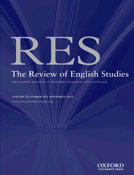
REVIEW OF ENGLISH STUDIES
Pioneering Insights in Literature and LinguisticsREVIEW OF ENGLISH STUDIES, published by Oxford University Press, is a prestigious journal that has been advancing the fields of Literature and Literary Theory as well as Linguistics and Language since its inception in 1925. With an impressive impact factor and a commendable ranking, placing it in the Q1 and Q2 categories across relevant disciplines, the journal serves as a vital platform for researchers, scholars, and students alike. Covering a wide range of topics from classical literature to contemporary linguistic analysis, REVIEW OF ENGLISH STUDIES is committed to fostering scholarly discourse and promoting innovative research methodologies. Although it does not offer open access, the journal is highly regarded for its rigorous peer-review process and high-quality publications, making it an essential resource for anyone engaged in English studies. For researchers seeking to keep abreast of the latest developments in the field, this journal stands as an indispensable guide and repository of knowledge.
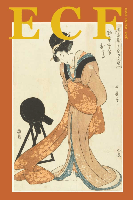
Eighteenth-Century Fiction
Fostering Interdisciplinary Insights into Eighteenth-Century NarrativesEighteenth-Century Fiction is a premier academic journal dedicated to advancing the study of literature from the eighteenth century, publishing innovative research that contributes to understanding the cultural and historical contexts of this dynamic period. Published by University of Toronto Press, Inc., this journal boasts an impressive Q1 categorization in the field of Literature and Literary Theory, reflecting its significant impact on discourse among scholars. Since its inception in 2002, the journal has provided a platform for interdisciplinary exploration and critical analysis, appealing to researchers, professionals, and students alike. With an ongoing commitment to quality and scholarly excellence, Eighteenth-Century Fiction serves as an essential resource for those seeking to delve into the literary innovations and societal transformations of the eighteenth century. Access to its rich collection of articles ensures that the academic community remains engaged with emerging trends and pivotal research in this vital area of study.
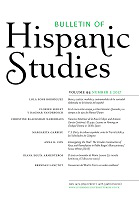
BULLETIN OF HISPANIC STUDIES
Navigating the Landscape of Hispanic Cultures and LinguisticsBULLETIN OF HISPANIC STUDIES, published by Liverpool University Press, is a distinguished peer-reviewed journal dedicated to the exploration of Hispanic cultures, literatures, and linguistic studies. With an ISSN of 1475-3839 and an E-ISSN of 1478-3398, this journal is a vital platform for researchers, scholars, and students alike, offering critical insights and innovative research from a broad spectrum of perspectives within its fields. Notably, as of 2023, it holds a commendable position in Q2 of Linguistics and Language and Q1 in Literature and Literary Theory, demonstrating its significant impact in these disciplines. The journal spans a period from 2002 to 2024, providing a rich historical arc of scholarship in Hispanic studies. It operates in the United Kingdom and remains accessible through subscription-only models, ensuring a quality curation of content. With a native address at 4 Cambridge St, Liverpool L69 7ZU, England, the BULLETIN OF HISPANIC STUDIES remains committed to advancing knowledge and fostering dialogue in the ever-evolving landscape of linguistic and literary inquiry.

Italianistica-Rivista di letteratura Italiana
Fostering Dialogue in the Realm of Italian LettersItalianistica-Rivista di letteratura Italiana is a distinguished academic journal dedicated to the exploration and analysis of Italian literature, published by FABRIZIO SERRA EDITORE. With its ISSN 0391-3368 and E-ISSN 1724-1677, the journal serves as a pivotal platform for scholars and researchers interested in literary theory and the richness of Italian literary heritage. Operating out of Pisa, Italy, it has been a significant contributor to the field since its inception in 2002, with publication converging through to 2023. Although classified in the Q4 category in Literature and Literary Theory for 2023, the journal occupies a unique position in fostering academic dialogue and advancing scholarly research amidst a competitive landscape, as evidenced by its Scopus rank of #784 out of 1106 in the same category. The journal does not currently offer open access options, making it a focused resource for those affiliated with institutions that facilitate access to subscription-based research. Researchers and students alike will find Italianistica invaluable for its rigorous scholarship and commitment to the nuanced study of Italian literature.

CAMBRIDGE QUARTERLY
Charting New Territories in Literary ResearchCAMBRIDGE QUARTERLY, published by Oxford University Press, stands as a dedicated outlet for scholarly discourse in the realm of Literature and Literary Theory. Since its inception in 1965, this journal has fostered a rich landscape for academic inquiry and discussion, with a commitment to exploring the intricate dynamics of literary studies up to 2024 and beyond. With an ISSN of 0008-199X and an E-ISSN of 1471-6836, CAMBRIDGE QUARTERLY offers a platform for innovative research, although it currently does not provide open access options. The journal is noted for its scholarly contributions, ranking in the Q4 quartile within its category based on the 2023 metrics, and holds the 635th rank in Scopus for Arts and Humanities specifically focused on Literature and Literary Theory, placing it in the 42nd percentile. As such, it appeals to researchers, professionals, and students alike, seeking to deepen their understanding of literary discourse and theoretical frameworks.

NOVYI MIR
Fostering Critical Discourse in the HumanitiesNOVYI MIR, published by IZD STVO IZVESTIYA, is a distinguished journal that provides a platform for scholarly discourse in the humanities, literature, and cultural studies. With an ISSN of 0130-7673, this journal has made significant contributions to the academic community, particularly within Russia and Eastern Europe. Although it does not currently offer an open access model, its content is revered for its quality and depth, catering to researchers, professionals, and students alike. With a commitment to examining contemporary issues through a literary lens, NOVYI MIR is essential for those seeking to explore the intersection of culture and society. The journal's relevance is underscored by its esteemed reputation in literary circles, making it a vital resource for anyone dedicated to understanding the nuances of Russian literature and thought.